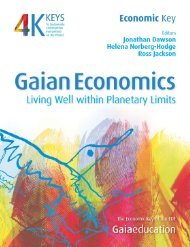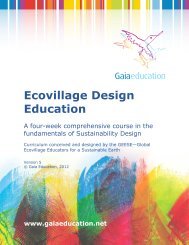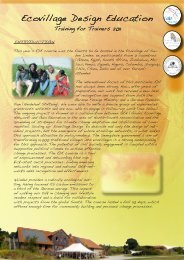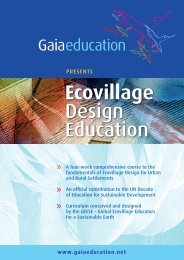Designing Ecological Habitats - Gaia Education
Designing Ecological Habitats - Gaia Education
Designing Ecological Habitats - Gaia Education
You also want an ePaper? Increase the reach of your titles
YUMPU automatically turns print PDFs into web optimized ePapers that Google loves.
integral ecology: Design principles for sustainable Human <strong>Habitats</strong> 241<br />
the difference between population ecology and community ecology; individuals<br />
working in the field of acoustic ecology do not know about linguistic ecology.<br />
Today there is a bewildering diversity of views on ecology and the<br />
environment. With more than 200 distinct and valuable perspectives on the<br />
natural world – and with researchers, economists, ethicists, psychologists,<br />
and others often taking completely different stances on the issues – how<br />
can we come to agreement to solve the toughest environmental problems<br />
of the 21 st century? We need a framework to help sort through these many<br />
approaches and connect them in a pragmatic way that honors their unique<br />
insights on their own terms. Integral Ecology provides this framework: a<br />
way of integrating multiple approaches to ecology and environmental<br />
studies into a complex, multidimensional, meta-disciplinary approach<br />
to the natural world and our embeddedness within it. Integral Ecology<br />
unites valuable insights from multiple perspectives into a comprehensive<br />
theoretical framework, one that is already being put to use around the<br />
globe. This framework is the result of over a decade of research exploring<br />
the many perspectives on ecology available to us today and their respective<br />
methodologies. In short, this framework provides a way of understanding<br />
the relationship between who is perceiving nature, how the perceiver uses<br />
different methods, techniques, and practices to disclose nature, and what is<br />
perceived as nature.<br />
Integral Ecology is a comprehensive framework for characterizing ecological<br />
dynamics and resolving environmental problems. It is comprehensive<br />
in that it both draws upon and provides a theoretical scheme for showing the<br />
relations among a variety of different methods, including those at work in<br />
the natural and social sciences, as well as in the arts and humanities. Integral<br />
Ecology unites, coordinates, and mutually enriches knowledge generated<br />
from different major disciplines and approaches. Integral Ecology can be:<br />
a) applied within a discipline (e.g., by integrating various schools of ecology);<br />
b) applied as a multidisciplinary approach (e.g., by investigating ecological<br />
problems from several disciplines); c) applied as an interdisciplinary approach<br />
(e.g. by using social science methods to shed light on economic or political<br />
aspects of environmental values); and d) applied as a transdisciplinary<br />
approach (e.g. by helping numerous approaches and their methodologies<br />
interface through a well grounded meta-framework).<br />
The Integral Ecology framework has promising applications in many<br />
areas: outdoor schools, urban planning, wilderness trips, policy development,<br />
restoration projects, environmental impact assessments, green business,<br />
village design and community development to name a few. In fact, a wide<br />
variety of ecologists, environmentalists, urban planners, wilderness guides,<br />
and activists recognize the theoretical comprehensiveness and practical<br />
efficacy of Integral Ecology and have been using its principles and distinctions<br />
successfully in a variety of contexts: community development in El Salvador,<br />
marine fisheries in Hawaii, eco-activism in British Columbia, climate change<br />
initiatives in Norway, permaculture in Australia, environmental policy in<br />
Tasmania, sustainable consumption and waste reduction in Calgary, and







